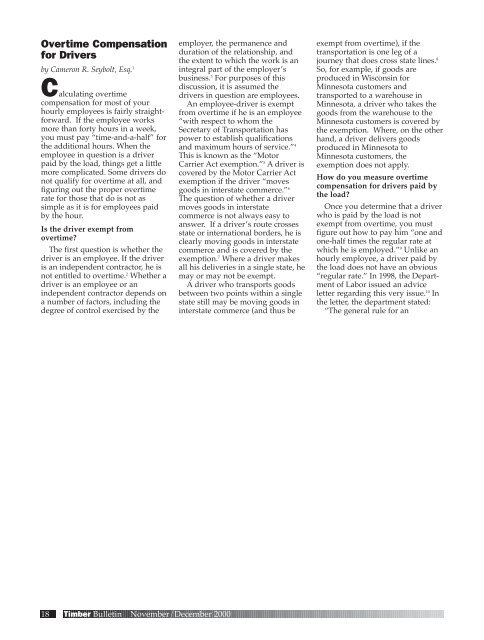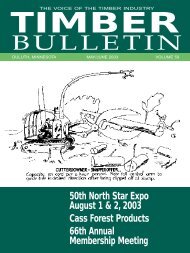Timber Bulletin Nov/Dec - Minnesota Forest Industries
Timber Bulletin Nov/Dec - Minnesota Forest Industries
Timber Bulletin Nov/Dec - Minnesota Forest Industries
You also want an ePaper? Increase the reach of your titles
YUMPU automatically turns print PDFs into web optimized ePapers that Google loves.
Overtime Compensation<br />
for Drivers<br />
by Cameron R. Seybolt, Esq. 1<br />
Calculating overtime<br />
compensation for most of your<br />
hourly employees is fairly straightforward.<br />
If the employee works<br />
more than forty hours in a week,<br />
you must pay “time-and-a-half” for<br />
the additional hours. When the<br />
employee in question is a driver<br />
paid by the load, things get a little<br />
more complicated. Some drivers do<br />
not qualify for overtime at all, and<br />
figuring out the proper overtime<br />
rate for those that do is not as<br />
simple as it is for employees paid<br />
by the hour.<br />
Is the driver exempt from<br />
overtime?<br />
The first question is whether the<br />
driver is an employee. If the driver<br />
is an independent contractor, he is<br />
not entitled to overtime. 2 Whether a<br />
driver is an employee or an<br />
independent contractor depends on<br />
a number of factors, including the<br />
degree of control exercised by the<br />
employer, the permanence and<br />
duration of the relationship, and<br />
the extent to which the work is an<br />
integral part of the employer’s<br />
business. 3 For purposes of this<br />
discussion, it is assumed the<br />
drivers in question are employees.<br />
An employee-driver is exempt<br />
from overtime if he is an employee<br />
“with respect to whom the<br />
Secretary of Transportation has<br />
power to establish qualifications<br />
and maximum hours of service.” 4<br />
This is known as the “Motor<br />
Carrier Act exemption.” 5 A driver is<br />
covered by the Motor Carrier Act<br />
exemption if the driver “moves<br />
goods in interstate commerce.” 6<br />
The question of whether a driver<br />
moves goods in interstate<br />
commerce is not always easy to<br />
answer. If a driver’s route crosses<br />
state or international borders, he is<br />
clearly moving goods in interstate<br />
commerce and is covered by the<br />
exemption. 7 Where a driver makes<br />
all his deliveries in a single state, he<br />
may or may not be exempt.<br />
A driver who transports goods<br />
between two points within a single<br />
state still may be moving goods in<br />
interstate commerce (and thus be<br />
exempt from overtime), if the<br />
transportation is one leg of a<br />
journey that does cross state lines. 8<br />
So, for example, if goods are<br />
produced in Wisconsin for<br />
<strong>Minnesota</strong> customers and<br />
transported to a warehouse in<br />
<strong>Minnesota</strong>, a driver who takes the<br />
goods from the warehouse to the<br />
<strong>Minnesota</strong> customers is covered by<br />
the exemption. Where, on the other<br />
hand, a driver delivers goods<br />
produced in <strong>Minnesota</strong> to<br />
<strong>Minnesota</strong> customers, the<br />
exemption does not apply.<br />
How do you measure overtime<br />
compensation for drivers paid by<br />
the load?<br />
Once you determine that a driver<br />
who is paid by the load is not<br />
exempt from overtime, you must<br />
figure out how to pay him “one and<br />
one-half times the regular rate at<br />
which he is employed.” 9 Unlike an<br />
hourly employee, a driver paid by<br />
the load does not have an obvious<br />
“regular rate.” In 1998, the Department<br />
of Labor issued an advice<br />
letter regarding this very issue. 10 In<br />
the letter, the department stated:<br />
“The general rule for an<br />
18 <strong>Timber</strong> <strong>Bulletin</strong> <strong>Nov</strong>ember/<strong>Dec</strong>ember 2000

















